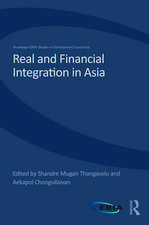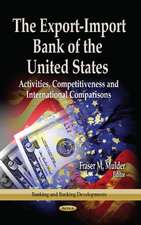The Capital Needs of Central Banks: Routledge International Studies in Money and Banking
Editat de Sue Milton, Peter Sinclairen Limba Engleză Hardback – 29 oct 2010
This collection takes the reader through historical, theoretical and factual discussions on why central banks exist and the role – actual and intended – they have in assisting their home nation in achieving monetary and financial stability. The contributions analyse the different ways central banks are funded and how funding arrangements may impact on their independence. The objective is to explore these themes first from the academic and practitioner’s views – those of the economist, accountant and lawyer’s – and then to introduce practical experiences from a range of different central banks, in terms of their economic and socio-political environments. It will be the first time that the theorist and practitioner, the accountant, the economist and the lawyer come together in one volume. The reader will be able to access the full breadth of views on this important subject.
The main observations are that there is no single, quantifiable formula that central banks can use to calculate capital levels. Factors to consider are the historical context of central banks and whether capital was ever appropriate to needs at their foundation; the cultural, social and political contexts; and, in terms of the presentation of financial statements, profit and loss sharing arrangements and what accounting conventions are being used. If these are considered alongside the, often idiosyncratic, mandates individual central banks have, a qualitative understanding of what is an appropriate level of capital is achieved. This collection will be of interest to postgraduates and researchers focusing on the role of central banks in monetary economics; as well as a professional audience of central bankers, the BIS, the IMF, World Bank, EBRD and government departments.
| Toate formatele și edițiile | Preț | Express |
|---|---|---|
| Paperback (1) | 403.15 lei 6-8 săpt. | |
| Taylor & Francis – 11 noi 2013 | 403.15 lei 6-8 săpt. | |
| Hardback (1) | 1090.69 lei 6-8 săpt. | |
| Taylor & Francis – 29 oct 2010 | 1090.69 lei 6-8 săpt. |
Din seria Routledge International Studies in Money and Banking
-
 Preț: 309.94 lei
Preț: 309.94 lei -
 Preț: 311.18 lei
Preț: 311.18 lei -
 Preț: 284.40 lei
Preț: 284.40 lei -
 Preț: 313.60 lei
Preț: 313.60 lei -
 Preț: 311.41 lei
Preț: 311.41 lei -
 Preț: 307.47 lei
Preț: 307.47 lei -
 Preț: 313.17 lei
Preț: 313.17 lei -
 Preț: 309.87 lei
Preț: 309.87 lei -
 Preț: 310.84 lei
Preț: 310.84 lei - 9%
 Preț: 864.83 lei
Preț: 864.83 lei -
 Preț: 665.08 lei
Preț: 665.08 lei - 18%
 Preț: 1151.18 lei
Preț: 1151.18 lei - 18%
 Preț: 1099.89 lei
Preț: 1099.89 lei - 18%
 Preț: 1034.60 lei
Preț: 1034.60 lei - 18%
 Preț: 1045.51 lei
Preț: 1045.51 lei - 24%
 Preț: 148.75 lei
Preț: 148.75 lei - 25%
 Preț: 503.03 lei
Preț: 503.03 lei - 18%
 Preț: 1037.34 lei
Preț: 1037.34 lei - 26%
 Preț: 819.13 lei
Preț: 819.13 lei - 18%
 Preț: 1037.34 lei
Preț: 1037.34 lei - 26%
 Preț: 820.21 lei
Preț: 820.21 lei - 18%
 Preț: 1035.97 lei
Preț: 1035.97 lei - 26%
 Preț: 763.82 lei
Preț: 763.82 lei - 18%
 Preț: 1034.87 lei
Preț: 1034.87 lei - 15%
 Preț: 253.63 lei
Preț: 253.63 lei - 18%
 Preț: 1043.12 lei
Preț: 1043.12 lei - 18%
 Preț: 688.12 lei
Preț: 688.12 lei - 18%
 Preț: 1143.00 lei
Preț: 1143.00 lei - 26%
 Preț: 848.05 lei
Preț: 848.05 lei - 18%
 Preț: 1093.74 lei
Preț: 1093.74 lei - 26%
 Preț: 850.68 lei
Preț: 850.68 lei - 18%
 Preț: 1039.36 lei
Preț: 1039.36 lei - 26%
 Preț: 822.31 lei
Preț: 822.31 lei - 18%
 Preț: 1096.47 lei
Preț: 1096.47 lei - 26%
 Preț: 823.24 lei
Preț: 823.24 lei - 26%
 Preț: 1186.42 lei
Preț: 1186.42 lei - 26%
 Preț: 851.75 lei
Preț: 851.75 lei - 18%
 Preț: 1091.72 lei
Preț: 1091.72 lei -
 Preț: 409.82 lei
Preț: 409.82 lei - 25%
 Preț: 856.60 lei
Preț: 856.60 lei - 18%
 Preț: 1044.14 lei
Preț: 1044.14 lei - 18%
 Preț: 1145.06 lei
Preț: 1145.06 lei - 18%
 Preț: 1037.34 lei
Preț: 1037.34 lei - 25%
 Preț: 852.83 lei
Preț: 852.83 lei - 18%
 Preț: 1038.01 lei
Preț: 1038.01 lei - 18%
 Preț: 1215.77 lei
Preț: 1215.77 lei - 26%
 Preț: 1185.61 lei
Preț: 1185.61 lei
Preț: 1090.69 lei
Preț vechi: 1330.11 lei
-18% Nou
Puncte Express: 1636
Preț estimativ în valută:
208.74€ • 216.82$ • 173.39£
208.74€ • 216.82$ • 173.39£
Carte tipărită la comandă
Livrare economică 01-15 februarie 25
Preluare comenzi: 021 569.72.76
Specificații
ISBN-13: 9780415553285
ISBN-10: 0415553288
Pagini: 224
Ilustrații: 15 b/w images, 26 tables and 15 line drawings
Dimensiuni: 156 x 234 x 18 mm
Greutate: 0.57 kg
Ediția:1
Editura: Taylor & Francis
Colecția Routledge
Seria Routledge International Studies in Money and Banking
Locul publicării:Oxford, United Kingdom
ISBN-10: 0415553288
Pagini: 224
Ilustrații: 15 b/w images, 26 tables and 15 line drawings
Dimensiuni: 156 x 234 x 18 mm
Greutate: 0.57 kg
Ediția:1
Editura: Taylor & Francis
Colecția Routledge
Seria Routledge International Studies in Money and Banking
Locul publicării:Oxford, United Kingdom
Public țintă
Postgraduate and UndergraduateCuprins
1. Central bank’s capital: An Introduction Peter Sinclair and Sue Milton 2. Central bank finances and independence: how much capital should a central bank have? Alex Cukierman 3. Central bank financial strength and macroeconomic policy performance Peter Stella 4. Financing the central bank: capital adequacy and financial independence – an accountant’s perspective Robin Darbyshire 5. Securing financial independence in the legal basis of a central bank Fabian Amtenbrink 6. Central bank capital adequacy: the cases of central banks with or without monetary policy Luca Papi 7. Exchange rate appreciation and negative central bank capital: is there a problem? Jan Frait and Tomáš Holub 8. Central bank losses, electronic money and contestable central banking Yúksel Górmez 9. Funding models for central banks: is the European Central Bank a special case? Ian Ingram 10. The evolving financial arrangements and independence of the National Bank of Poland Wojciech Kolodziej 11. Central bank funding models and their risk-return profile J Ramón Martínez-Resanó 12. How asset liability management techniques can help central banks Age Bakker, Han van der Hoorn and Leonard Zwikker
Notă biografică
Sue Milton works in the Bank of England’s Centre for Central Banking Studies, where she is an adviser on central bank governance.
Peter Sinclair is Professor of Economics at the University of Birmingham, UK.
Peter Sinclair is Professor of Economics at the University of Birmingham, UK.
Descriere
This collection takes the reader through historical, theoretical and factual discussions on why central banks exist and the role – actual and intended – they have in assisting their home nation in achieving monetary and financial stability.












